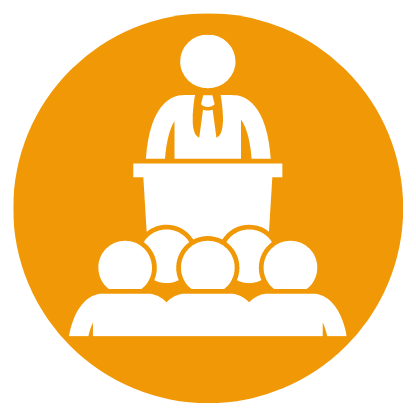How To Speak Up In Meetings | HBR
Reference: Harvard Business Review. (2020, August 31). How to Speak Up in Meetings [Video]. YouTube.
We Make Your Education Count

Get the Credit You Deserve and Become the Most Attractive Job Candidate by Earning and Posting A+ Badges to Your Linkedin Profile.
Sign Up to Get Started at Accredicity
|
Learn how to speak up in meetings with confidence! Get tips from a professional speaker and master trainer to become the go-to person in every meeting. Christine Liu from Harvard Business Review presents "How to Speak Up in Meetings," sharing tips on how to overcome the fear of speaking up and contributing ideas in a professional setting. Through conversations with Justin Hale from VitalSmarts, she offers advice on how to prepare for meetings, how to introduce an idea and how to stay confident. First, she suggests starting with facts and data for credibility and buy-in, then tell a story with passion and emotion, and finally, ask a question to invite engagement. Justin also provides tips on how to recover if you're feeling lost, such as summarizing your thoughts in one sentence and not talking more. Christine's takeaway is to practice beforehand, and to remember that speaking up can have a big impact. Learning Outline1. Practice before the meeting to increase confidence. Instructional ContentSpeaking up in meetings can be intimidating, especially when it feels like everyone else has more experience or knowledge. It's normal to feel anxious, but with a few tips and tricks, it is possible to feel more confident and contribute meaningful ideas. In this video, Justin Hale from VitalSmarts talks about how to speak up in meetings. He explains that it is important to start with the facts, provide your story or opinion, and then ask for others' thoughts. He also emphasizes the importance of practicing before the meeting and summarizing your thoughts in one sentence if you start to feel lost. Justin's advice is incredibly helpful, and it is clear that even experienced professionals have trouble speaking up in meetings. It is important to note that there are many ways to be heard, and the most important thing is to be respectful and honest. By following the tips in this video, it is possible to feel more confident and contribute meaningful ideas to the conversation. Communication
|

Speaking up in meetings can be intimidating, but it doesn't have to be! To speak up confidently, practice ahead of time and think of what you want to say. When it's your turn to speak, start by giving facts (measurable stuff), then add your story or perspective, and end by asking for other people's views. That way, you can share your thoughts without overthinking or getting lost in the conversation. It might take some practice, but you can do it - just like Justin, a professional speaker, who sometimes has trouble too! Video Quotes"Actually, I have something that like touches upon like light-- not even controversial, but like, oh, that's different for me" - Christine Liu Related Quotes"It takes a lot of courage to speak up in a meeting, but it's worth it. Sometimes the most important contributions come from those who are the most quiet." -The narrator "The most successful people in the room are the ones who are willing to challenge the status quo." -The narrator "The most important thing is to practice. Until it becomes second nature, it's okay to feel uncomfortable." -The narrator Competencies1. Communication Etiquette Learning Outcomes1. Analyze different strategies to feel confident when speaking up in meetings (Bloom’s Taxonomy: Analyze) Sample Answers1. I learned that it can be difficult to speak up in meetings due to lack of confidence in one's own ability to be heard or lack of assurance that others will make it safe for them to voice their opinion. 2. Justin Hale suggested using the framework of facts, story, and conclusion to start speaking up in a meeting. He also suggested summarizing what one wants to say in one sentence and practicing before the actual moment to increase confidence. 3. Justin Hale also suggested asking an open-ended question that invites engagement in order to get feedback on one's ideas. He suggested avoiding talking more to get out of an awkward situation and instead stopping after saying one sentence. Christine LiuChristine Liu is a communications coach, speaker, and consultant. She is the author of the book Speak Up: Be Heard and Get Results and the founder of CCL Communications. She has a master’s degree in communication management from the Annenberg School for Communication at the University of Southern California. Christine has been helping professionals communicate more effectively for over 15 years. She is an expert on how to speak up in meetings because she helps people identify their personal communication style and develop confidence in their communication skills. Christine is associated with CCL Communications and you can learn more about her work at https://cclcommunications.com/ ">CCL Communications. AssessmentMultiple-Choice Exam Question: What is Justin Hale's advice for speaking up in meetings? A. Speak as much as possible B. Ask a question that invites engagement C. Practice beforehand D. Double down on your words Answer: C. Practice beforehand QuestionsCommon Hypothetical Questions: Real-Life Scenarios Questions: KeywordsSpeak Up in Meetings, Confidence in Speaking, Respectful Communication, Practice Beforehand, Summarize in One Sentence, Start with Facts, Lead with Story, Ask Questions, International Content Platform, Brainstorming Ideas, TikTok Demographics Facts1. Confidence is key when speaking up in meetings. Practicing what you are going to say beforehand can help increase your confidence and reduce the pressure to make sure what you say is worth it. 2. When speaking up, it is important to start with facts. Presenting data or measurable information can help gain buy-in from the audience. 3. It is crucial to be respectful when speaking up. Ask questions that invite engagement and foster real conversation. 4. If you lose your train of thought, it is best to summarize what you are trying to say in one sentence and stop talking. 5. International perspectives can be beneficial in meetings. Utilizing editors from different countries can provide insights from a global culture lens. Trends1. Introduce a "Raise Your Hand" system: Before the meeting starts, encourage participants to submit any topics, questions, or ideas that they would like to discuss in the meeting. At the beginning of the meeting, invite everyone to raise their hands if they have something to contribute and allow those with their hands raised to speak first. 2. Start a Meeting Buddy Program: A Meeting Buddy Program is where each participant is paired with someone from a different department or team. This person will act as a mentor and provide guidance if the participant has difficulty speaking up in meetings. 3. Hold "Lightning Rounds": At the beginning of the meeting, have each participant present a quick, 2-minute summary of their ideas or questions. This will give everyone an equal opportunity to speak up and share their thoughts. 4. Designate a Meeting Scribe: During a meeting, have a designated scribe who will take notes on everyone's contributions. After the meeting, they can email the notes to everyone who attended. This will ensure that everyone's contributions are heard and documented. SourceThis learning instructional guidance was formulated using the GPT-3 language model created by OpenAI. ShareDon't be afraid to speak up in meetings! With a few key tips, you can be confident and make your voice heard. #Confidence #Teamwork #SpeakingUp #Meetings 💪 @Accredicity |








 123 Creds - Communication
123 Creds - Communication



